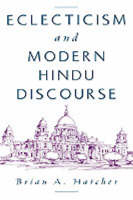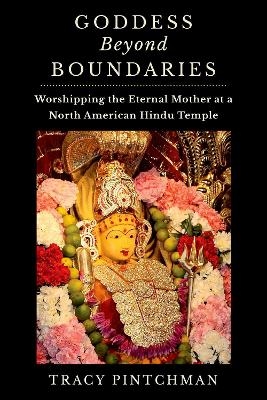
Eclecticism and Modern Hindu Discourse
Seiten
1999
Oxford University Press Inc (Verlag)
978-0-19-512538-2 (ISBN)
Oxford University Press Inc (Verlag)
978-0-19-512538-2 (ISBN)
This book examines the classical roots and contempoary significance of eclecticism within modern Hindu discourse. It focuses on the thought of Swami Vivekananda as exemplary of the tone and character of modern Hindu eclecticism and then seeks to identify its historical Indian antecedents.
Hindu apologists routinely support their interpretations of the Hindu world view with what seems an almost promiscuous use of the world's many philosophies and religions. The truths of Hindu thought are commonly demonstrated with references to sources as disparate as the Upanishads, the New Testament, and the sermons of Theodore Parker. These strange, even bizarre, juxtapositions pose a troubling problem for many sympathetic Western scholars of this tradition, namely, what to do about the absurdities that Indian thinkers want to pass for historical truths?
This book examines the classical roots and contempoary significance of eclecticism within modern Hindu discourse. Hatcher begins by focusing on the thought of Swami Vivekananda as exemplary of the tone and character of modern Hindu eclecticism. Vivekananda, who became well-known in the West after his sensational appearance at the Chicago World's Fair of 1893, regularly spiced his lectures with references to Jesus, the Buddha, and the prophet Muhammad, as well as to his own personal guru, Sri Ramakrishna. Hatcher then seeks to identify the ancient Indian antecedents of this eclecticism, finding them especially in the sacrificial ritualism of the Vedas. Returning to the modern period, he focuses on 19th-century Bengal, introducing the reader to a wide range of modern Indian eclecticisms. The development of Hindu thought during this period, Hatcher argues, can only be understood within the context of the enforced cultural encounter created by British colonial rule. In conclusion, Hatcher attempts to strike a delicate balance between the contending views of eclecticism as poesis and as a form of false consciousness. He proposes a pragmatic approach to evaluating the validity of eclectic knowledge.
Hindu apologists routinely support their interpretations of the Hindu world view with what seems an almost promiscuous use of the world's many philosophies and religions. The truths of Hindu thought are commonly demonstrated with references to sources as disparate as the Upanishads, the New Testament, and the sermons of Theodore Parker. These strange, even bizarre, juxtapositions pose a troubling problem for many sympathetic Western scholars of this tradition, namely, what to do about the absurdities that Indian thinkers want to pass for historical truths?
This book examines the classical roots and contempoary significance of eclecticism within modern Hindu discourse. Hatcher begins by focusing on the thought of Swami Vivekananda as exemplary of the tone and character of modern Hindu eclecticism. Vivekananda, who became well-known in the West after his sensational appearance at the Chicago World's Fair of 1893, regularly spiced his lectures with references to Jesus, the Buddha, and the prophet Muhammad, as well as to his own personal guru, Sri Ramakrishna. Hatcher then seeks to identify the ancient Indian antecedents of this eclecticism, finding them especially in the sacrificial ritualism of the Vedas. Returning to the modern period, he focuses on 19th-century Bengal, introducing the reader to a wide range of modern Indian eclecticisms. The development of Hindu thought during this period, Hatcher argues, can only be understood within the context of the enforced cultural encounter created by British colonial rule. In conclusion, Hatcher attempts to strike a delicate balance between the contending views of eclecticism as poesis and as a form of false consciousness. He proposes a pragmatic approach to evaluating the validity of eclectic knowledge.
1. Introduction ; 2. "Difference Relates": Eclecticism Past and Present ; 3. Swami in Wonderland: Vivekananda's Eclectic Hermeneutics ; 4. What's the Connection? India's Eclectic Heritage ; 5. Varieties of Eclectic Experience: The Case of Colonial Bengal ; 6. My Own Private Bungalow: The Dynamics of Eclectic Home-Building ; 7. Conclusion ; Bibliography ; Index
| Erscheint lt. Verlag | 29.7.1999 |
|---|---|
| Zusatzinfo | 3 line drawings |
| Verlagsort | New York |
| Sprache | englisch |
| Maße | 157 x 234 mm |
| Gewicht | 522 g |
| Themenwelt | Geisteswissenschaften ► Religion / Theologie ► Hinduismus |
| ISBN-10 | 0-19-512538-X / 019512538X |
| ISBN-13 | 978-0-19-512538-2 / 9780195125382 |
| Zustand | Neuware |
| Haben Sie eine Frage zum Produkt? |
Mehr entdecken
aus dem Bereich
aus dem Bereich
Worshipping the Eternal Mother at a North American Hindu Temple
Buch | Hardcover (2024)
Oxford University Press Inc (Verlag)
79,80 €


